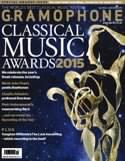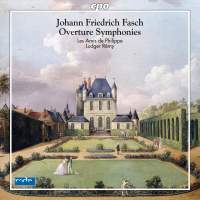Texte paru dans: / Appeared in: |
|
|
Outil de traduction (Très approximatif) |
|
|
Reviewer: Richard Wigmore
Like his more famous contemporary Telemann, Johann Friedrich Fasch was always alert to the latest musical trends. When the Italian sinfonia became fashionable north of the Alps, he responded with his own hybrid genre incorporating the traditional French Baroque overture within the sinfonia’s three-movement plan. The upshot was a series of eight ‘Overture Symphonies’, scored for strings with an assorted array of wind and brass, five of which are included here.
Fasch was renowned for his wind- and brass-writing, and you can hear why in the panoplies of horns and trumpets, expertly manipulated, in the two D major overtures, and the quartet of horns, plus oboes and bassoons, in the second of the G major works. Telemann, much admired by Fasch, is the obvious reference point in music on the cusp of the Baroque and the galant (counterpoint is at a premium), though for all his musical savoir faire, Fasch lacks Telemann’s gift for a catchy tune and a piquant harmonic twist. While the fast movements are carried by their propulsive energy and bold colour contrasts, the central andantes emerge as bland and short-breathed, sometimes sounding like fast music slowed down. If the attention occasionally wanders, I sympathise.
Still, it’s hard to fault the
lively advocacy of the German period band Les Amis de Philippe (the ‘Philippe’
in question is Carl Philipp Emanuel Bach) under their harpsichordist director
Ludger Rémy. Fasch’s allegros, often in passepied rhythm, go with a lusty swing.
The braying, hollering brass enjoy themselves hugely, while oboes and pealing
high horns spar agreeably in the F major Overture. Textures are clear and well
balanced. If these works aren’t quite on the level of Fasch’s wind and brass
concertos, they contain plenty to tickle the ear, not least in the whooping
finale of the F major Overture. As usual, CPO’s long bookletnote is printed in
minuscule type and translated by someone with scant command of English musical
terminology. |
|
|
|
|
|
Cliquez l'un ou l'autre
bouton pour découvrir bien d'autres critiques de CD |
|




